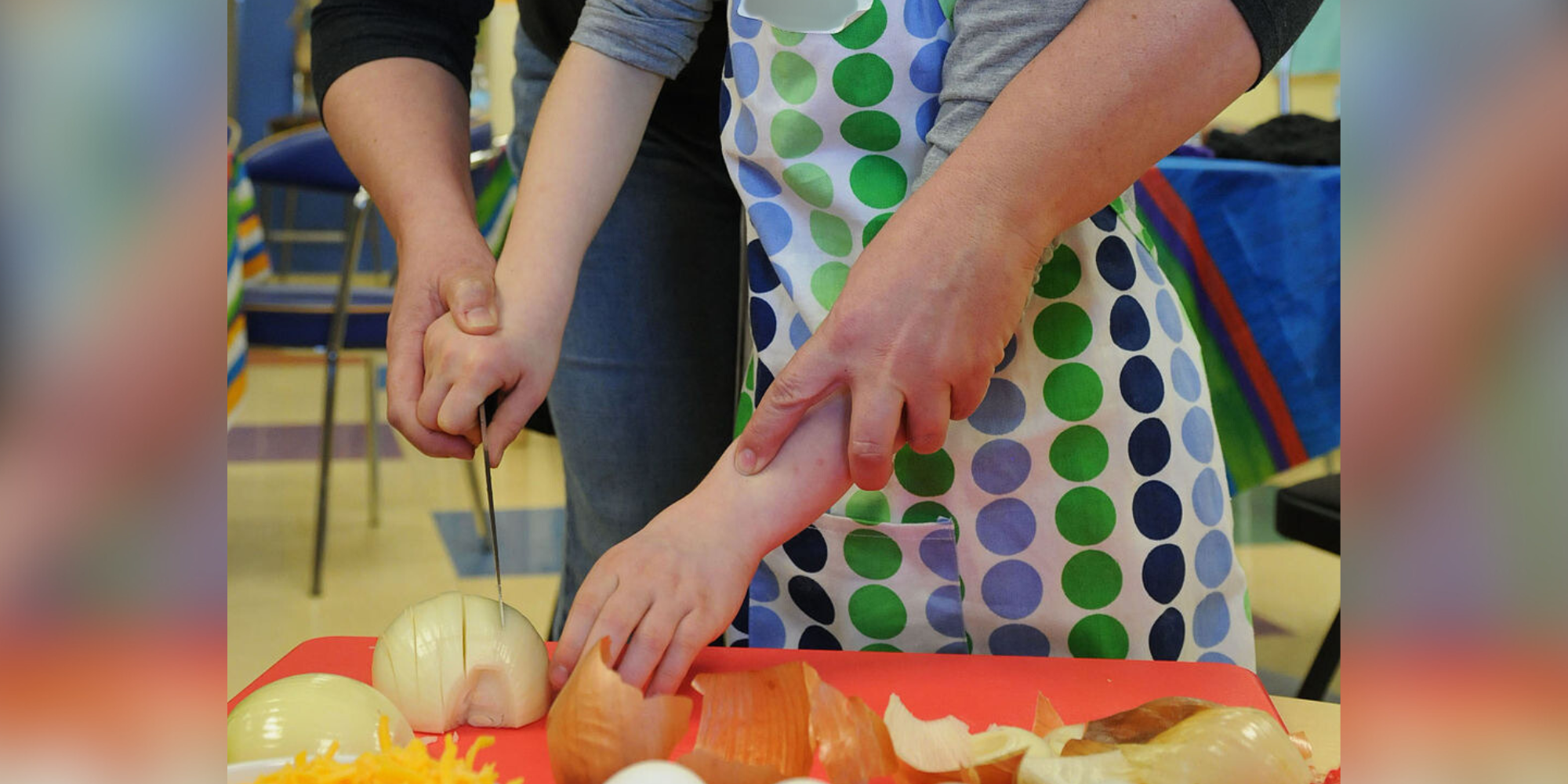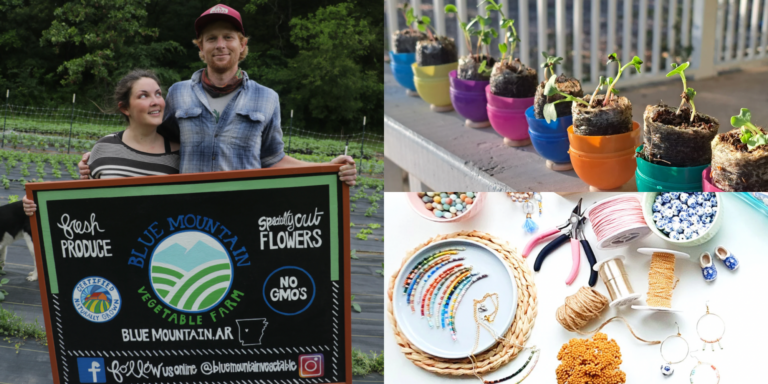3 Healthy Habits For Families to Celebrate Food
How to focus on wellness, not weight, in the new year.
How to focus on wellness, not weight, in the new year.

For some people, the new year is a time to make changes: healthy habits, new experiences, and other goals that set us up for a successful year.
But if you’ve noticed that New Year’s resolutions often involve weight loss and dieting, you’re not alone. Three of the five most common New Year’s resolutions are to improve fitness, improve diet, and lose weight, according to a Forbes survey from October.
There’s nothing wrong with embracing new habits in a new year—but focusing on weight loss can cause more harm than good, especially if you have kids.
FoodCorps spoke with Billie Karel, MPH, RD, LDN, CDCES, a registered dietitian who specializes in family feeding, to learn how families can embrace healthy habits that celebrate food, welcome all bodies, and encourage curiosity and joy. Here are three tips she recommends.
When it comes to health, weight isn’t the foolproof measure we often make it out to be.
Over the long haul, our body weight is influenced by many factors that aren’t within our direct control, Karel says. And focusing on weight control rather than healthy habits, like nutritious and satisfying foods and joyful movement, usually hurts our health more than it helps in the long run.
“Childhood, adolescence, and early adulthood are seasons of life when our bodies change and grow really quickly, and we’re exquisitely vulnerable to eating disorders,” says Karel. “Children’s bodies are growing, and they’re supposed to be.”
For a weight-neutral approach to building healthy habits, Karel suggests talking with kids about the ways food nourishes our bodies and brings us joy. That includes celebrating all kinds of foods and what makes them unique, without moralizing or labeling them.
“We can talk about delicious and nutritious foods that support our good health—cardiovascular, immune, digestive. We can talk about eating in ways that help somebody feel their best,” Karel says. This includes talking about cultural foods, special occasion foods, and any foods a kid might enjoy or come across.
“If the point of nutrition is to help people feel well and have good health, making nutrition into a weight control project really misleads us—and drives us to do things that don’t actually feel very good,” Karel says.
We know that when kids help grow or cook food, they’re more likely to try it—at home or at school. That means involving children in preparing meals can get them excited about what they’re eating.
The most straightforward way to do this is to eat meals together, Karel says, which is easier said than done for a family on a tight schedule. In any case, if your family can sit down to a meal together, Karel suggests involving kids not just in the cooking, but in the setup—setting the table, passing the peas, tidying the kitchen afterwards.
But this habit also involves talking to your children about your favorite foods, telling stories about foods you loved as a kid, or discovering new foods together at your local farmers market or grocery store. It means celebrating the foods that kids take interest in, like baking treats for their birthday, and encouraging them to keep exploring.
“For a lot of us, social eating feels really different than eating by ourselves in a really positive way,” Karel says. “Food connects us to each other, to our culture, to the moment.”
To take this mindset a step further, Karel suggests picking out an unfamiliar food or an ingredient from a different culture together, then exploring it as a family.
“Try dipping it, seasoning it, eating it as a salad, eating it cooked,” Karel says. She also encourages modifying food to your liking in front of your child—say, adding a pat of butter to your potato, picking out the raisins in your salad, or whatever it means to enjoy your food to the fullest. “The way we eat and feed ourselves in front of [kids] has a big influence on how they are learning to feed themselves as they grow,” she says.
Karel also notes that these practices might look different for neurodivergent kids or those with sensory sensitivities—and that families should create a routine that works for them. “Families should endeavor to accommodate the actual child they have,” she says. “It’s a morally neutral thing whether our kids do better eating in groups, with us, [or with] some quiet time.”
You’ve heard the saying: kids are sponges. They hear everything grown-ups talk about, whether they’re supposed to or not. And when adults comment on their own bodies or other people’s bodies, kids notice.
“Kids pick up a lot of our values and judgments from the way we talk about food and bodies, whether or not we’re talking about their food and their body,” Karel says.
That’s why it’s crucial, Karel says, not to make disparaging comments about your body or food choices—or anybody else’s. Many of today’s parents were subject to the height of diet culture in the last several decades, so it can take some intentional work to stop repeating those long-ingrained messages. But it’s worth it to help shape a more positive future for your kids.
Another healthy habit to adopt is to expand how you talk about food while eating. When you’re eating with your child, Karel says, notice the food’s sensory qualities together. What does the outside feel like? What color is it on the inside? Is it crunchy, soft, sticky? Answering these questions together builds curiosity into the tasting experience without any judgment of whether the food is “good” or “bad” for you.
Karel also points out that plenty of adults in a child’s life might still talk about weight or food in unsupportive ways. She suggests reaching out to a weight-inclusive practitioner, like a dietitian or mental health provider, if your family needs extra support.
“There are a lot of really fantastic resources for parents on a food neutrality journey or body neutrality journey,” Karel says. “If [a parent or caregiver] feels like the only one who is seeing it differently, it can be really helpful to connect with parents all around the world who are being intentional.”
Learn more about diet-free nutrition and healthy habits for families at Sunny Side Up Nutrition.
Related read: What Does ‘Healthy’ Mean? Our Vision for Healthy Food | “We know that hungry, undernourished children cannot learn. But neither can kids who struggle with low self-esteem, disordered eating, or the slew of other hardships that stem from a societal obsession with diet culture, weight loss, and other strict ideas about what it means to be ‘healthy.’ Mental and emotional health are crucial to this conversation, too.”

9 Thoughtful Holiday Gifts Made by FoodCorps Alumni

The Policy Brief, Fall 2024: After the Election

Food as Medicine: Teaching Indigenous Foodways